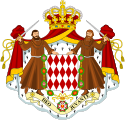Head of government of Monaco
The Prime Minister of Monaco , literally the Minister of State (French : Ministre d'État ; Monégasque : Ministru de Statu ), is the head of government of Monaco , appointed by and subordinate to the Prince of Monaco .
During their term of office, the officeholder is responsible for directing the work of the government and in charge of foreign relations . As the monarch's representative, the prime minister also presides (with voting powers) over the Council of Government , directs the executive services and commands the police and military .
Since 2 September 2024, Didier Guillaume has been prime minister.
History of the office
Official residence of the prime minister The office was created in 1911 with the adoption of Monaco's constitution . Until the 2002 constitutional revision, the prime minister had to be a French citizen , selected from several senior civil servants proposed by the Government of France . Since 2002, the prime minister can be either French or Monegasque and is chosen and appointed by the monarch, after consultation with the Government of France.[ 2]
List of officeholders
No.
Portrait
Name(born–died)
Term of office
Party
Prince
Took office
Left office
Time in office
1
Émile Flach (1853–1926)
February 1911
December 1917
6 years, 10 months
Independent
Albert I
—
Georges Jaloustre (1875–1951)acting
January 1918
February 1919
1 year, 1 month
2
Raymond Le Bourdon (1861–1937)
19 February 1919
11 August 1923
Louis II
3
Maurice Piette (1871–1953)
11 August 1923
February 1932
8 years, 5 months
—
Henry Mauran (1899–1983)acting
January 1932
June 1932
4 months
4
Maurice Bouilloux-Lafont (1875–1937)
June 1932
June 1937
5 years
—
Henry Mauran (1899–1983)acting
June 1937
August 1937
2 months
5
Émile Roblot (1886–1963)
15 September 1937
29 September 1944
—
Pierre Blanchy (1897–1981)acting
29 September 1944
13 October 1944
6
Pierre de Witasse (1878–1956)
13 October 1944
December 1948
4 years, 1 month
—
Pierre Blanchy acting 4 January 1949
12 July 1949
Rainier III
7
Jacques Rueff (1896–1978)
12 July 1949
1 August 1950
8
Pierre Voizard (1896–1982)
1 August 1950
2 September 1953
9
Henry Soum (1899–1983)
15 November 1953
12 February 1959
10
Émile Pelletier (1898–1975)
12 February 1959
23 January 1962
—
Pierre Blanchy acting 23 January 1962
16 August 1963
11
Jean Reymond (1912–1992)
16 August 1963
28 December 1966
12
Paul Demange (1906–1970)
28 December 1966
1 April 1969
13
François-Didier Gregh (1906–1992)
1 April 1969
24 May 1972
14
André Saint-Mleux (1920–2012)
24 May 1972
July 1981
9 years, 1 month
15
Jean Herly (1920–1998)
July 1981
16 September 1985
4 years, 2 months
16
Jean Ausseil (1925–2001)
16 September 1985
16 February 1991
17
Jacques Dupont (1929–2002)
16 February 1991
2 December 1994
18
Paul Dijoud (born 1938)
2 December 1994
3 February 1997
19
Michel Lévêque (born 1933)
3 February 1997
5 January 2000
20
Patrick Leclercq (born 1938)
5 January 2000
1 May 2005
Albert II
21
Jean-Paul Proust (1940–2010)
1 May 2005
29 March 2010
22
Michel Roger (born 1949)
29 March 2010
16 December 2015
—
Gilles Tonelli (born 1957)acting
16 December 2015
1 February 2016
23
Serge Telle (born 1955)
1 February 2016
31 August 2020
24
Pierre Dartout (born 1954)
1 September 2020
2 September 2024
25
Didier Guillaume (born 1959)
2 September 2024
Incumbent
See also
References
External links
Heads of state and government of Europe
Heads
UN members Partially recognised2 Unrecognised states3
Heads of
UN members Partially recognised2 Unrecognised states3
1. Partially or entirely in Asia, depending on geographical definition.
2. Recognised by at least one United Nations member.
3. Not recognised by any United Nations members.

















